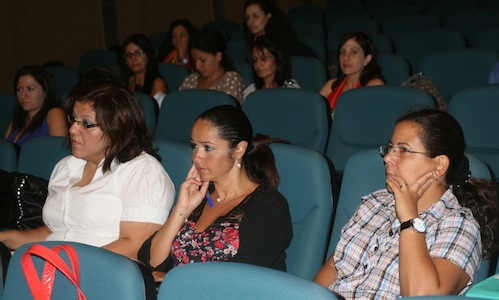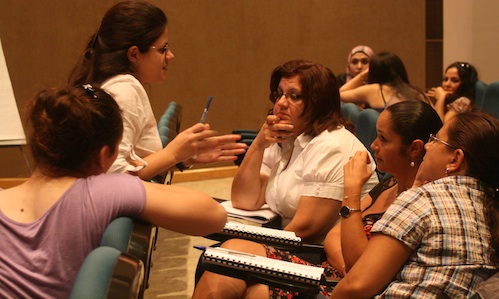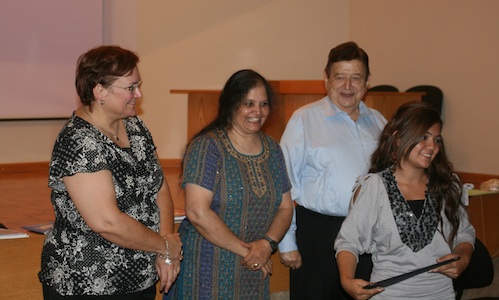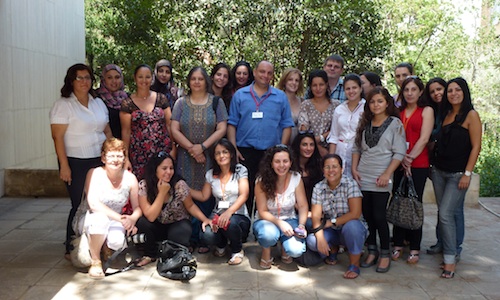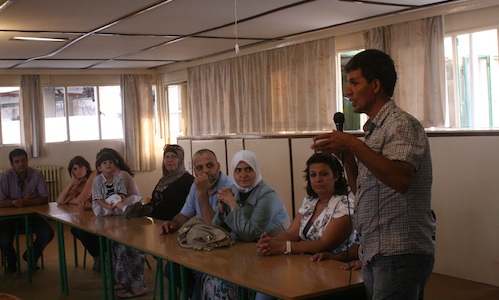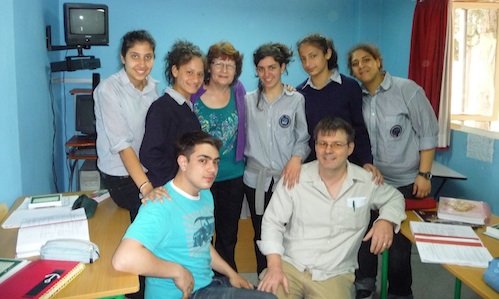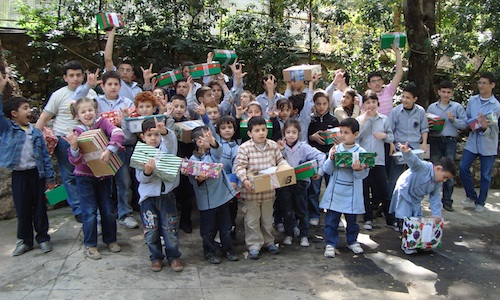Projects

This website, designed to help parents of children with hearing loss all over the world, is only one of EVDC's projects. International projects are another important facet of EVDC's efforts to bring spoken language to children with hearing loss in the developing world.
A fundamental problem in developing countries is the absence of a sound infrastructure to identify, diagnose, amplify, rehabilitate, and follow up. Neonatal screening for hearing loss is non-existent or patchy at best. Thus, a fundamental task is to work with government, healthcare providers, and non-governmental organizations to set up effective systems to identify babies as early as possible. Early identification is the key.
Once babies are identified, we need a system to make sure they are tested and, if found to have a hearing loss, are appropriately fitted with hearing aids or a cochlear implant, and are provided with adequate, appropriate therapy to help them develop spoken language.
Then there is the need to train teachers and therapists in the latest auditory-verbal therapeutic and classroom techniques. The schools and clinics need help in formulating and implementing strategies and quality control systems.
This is a huge task. But, "the journey of a thousand miles begins with the first step!" You can see some of our first steps below. As we generate resources, we hope to expand our efforts in both geographical scope and level of involvement.
A fundamental problem in developing countries is the absence of a sound infrastructure to identify, diagnose, amplify, rehabilitate, and follow up. Neonatal screening for hearing loss is non-existent or patchy at best. Thus, a fundamental task is to work with government, healthcare providers, and non-governmental organizations to set up effective systems to identify babies as early as possible. Early identification is the key.
Once babies are identified, we need a system to make sure they are tested and, if found to have a hearing loss, are appropriately fitted with hearing aids or a cochlear implant, and are provided with adequate, appropriate therapy to help them develop spoken language.
Then there is the need to train teachers and therapists in the latest auditory-verbal therapeutic and classroom techniques. The schools and clinics need help in formulating and implementing strategies and quality control systems.
This is a huge task. But, "the journey of a thousand miles begins with the first step!" You can see some of our first steps below. As we generate resources, we hope to expand our efforts in both geographical scope and level of involvement.
WORKSHOPS IN LEBANON !
Father Andeweg Institute for the Deaf (FAID) was founded by Father Arie Andeweg in 1957 in Beirut, Lebanon. Today, it provides an oral deaf education to over 70 children, ages 3 through 21. Most students are day scholars while others are residential. About a third have received cochlear implants; others have hearing aids. Both Arabic and English are taught. The institute has in-house audiological facilities.
In September 2011, Pratibha Srinivasan, Executive Director, EVDC, conducted a four-day training workshop in Beirut. This was sponsored by Friends of FAID, an Irish charity, and funded by USAID. In addition to the FAID personnel, the participants included education professionals several other schools for the deaf in Lebanon. Pratibha also met with parents of the FAID children to discuss ideas for working with their children at home.
Here are some photographs from the visit!
Update: In November 2011, Pratibha made another trip to FAID. This time, she provided hands-on training to the teachers by participating in actual classroom teaching with children of different age levels.
In September 2011, Pratibha Srinivasan, Executive Director, EVDC, conducted a four-day training workshop in Beirut. This was sponsored by Friends of FAID, an Irish charity, and funded by USAID. In addition to the FAID personnel, the participants included education professionals several other schools for the deaf in Lebanon. Pratibha also met with parents of the FAID children to discuss ideas for working with their children at home.
Here are some photographs from the visit!
Update: In November 2011, Pratibha made another trip to FAID. This time, she provided hands-on training to the teachers by participating in actual classroom teaching with children of different age levels.
WORKSHOPS IN INDIA !
Education, Audiology and Research (E.A.R.) Centre has been serving families of children with hearing loss in Mumbai, India, over 40 years. They provide auditory-verbal therapy in three different languages (English, Hindi, Marathi) for children ranging in age from birth through eight.
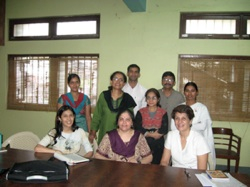 Two years ago, they began a newborn screening program in association with a local hospital. Led by Executive Director Mrs. Pervin Mehta, this nonprofit organization has ten teachers and therapists and two part-time audiologists.
Two years ago, they began a newborn screening program in association with a local hospital. Led by Executive Director Mrs. Pervin Mehta, this nonprofit organization has ten teachers and therapists and two part-time audiologists.
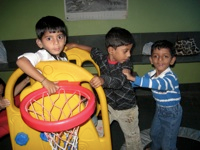 In December 2009, Pratibha Srinivasan, Executive Director, EVDC, provided training for the E.A.R. staff. She also met with the Education Board of the organization to discuss how E.A.R. can i) expand its newborn screening program, ii) lower the enrollment age of its children, iii) increase parental participation, and iv) provide ongoing training to the staff. The focus of this discussion was how EVDC can play an active role in helping E.A.R. achieve its objectives.
In December 2009, Pratibha Srinivasan, Executive Director, EVDC, provided training for the E.A.R. staff. She also met with the Education Board of the organization to discuss how E.A.R. can i) expand its newborn screening program, ii) lower the enrollment age of its children, iii) increase parental participation, and iv) provide ongoing training to the staff. The focus of this discussion was how EVDC can play an active role in helping E.A.R. achieve its objectives.

Pratibha (c) with E.A.R. Staff

E.A.R. Kids at Play
During December 2009, Pratibha also conducted a workshop at Kolhapur, in the state of Maharashtra, in India. It was made possible through the efforts of Dr. Madhav Gogate, an ENT Physician and Rotarian. The workshop was organized by the Rotary Centre for the Deaf in collaboration with the Shivaji University Continuing Education and Extension Centre.
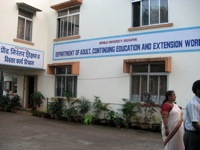 The Rotary Centre is a preschool for children (0-5) with hearing loss in Kolhapur. The Centre also provides audiological services and runs a newborn screening program in two local hospitals.
The Rotary Centre is a preschool for children (0-5) with hearing loss in Kolhapur. The Centre also provides audiological services and runs a newborn screening program in two local hospitals.
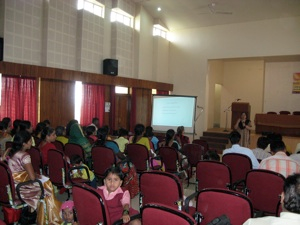 In addition to the local population, families and professionals from surrounding areas attended the workshop thanks to the publicity efforts of Shivaji University. In all, over 100 people were in attendance.The workshop, while covering information useful to professionals, was aimed primarily at parents. Parents were taught how to work with their hearing-impaired child at home to help him/her develop spoken language. Simple, yet effective auditory-verbal techniques were demonstrated with video clips and discussion.
In addition to the local population, families and professionals from surrounding areas attended the workshop thanks to the publicity efforts of Shivaji University. In all, over 100 people were in attendance.The workshop, while covering information useful to professionals, was aimed primarily at parents. Parents were taught how to work with their hearing-impaired child at home to help him/her develop spoken language. Simple, yet effective auditory-verbal techniques were demonstrated with video clips and discussion.

Shivaji University

Workshop for Parents and Professionals
